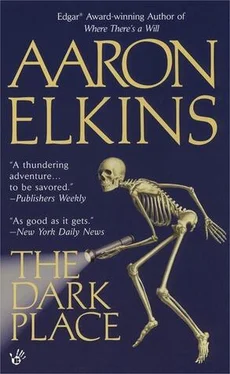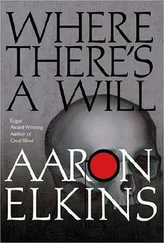Aaron Elkins - The Dark Place
Здесь есть возможность читать онлайн «Aaron Elkins - The Dark Place» весь текст электронной книги совершенно бесплатно (целиком полную версию без сокращений). В некоторых случаях можно слушать аудио, скачать через торрент в формате fb2 и присутствует краткое содержание. Жанр: Классический детектив, на английском языке. Описание произведения, (предисловие) а так же отзывы посетителей доступны на портале библиотеки ЛибКат.
- Название:The Dark Place
- Автор:
- Жанр:
- Год:неизвестен
- ISBN:нет данных
- Рейтинг книги:4 / 5. Голосов: 1
-
Избранное:Добавить в избранное
- Отзывы:
-
Ваша оценка:
- 80
- 1
- 2
- 3
- 4
- 5
The Dark Place: краткое содержание, описание и аннотация
Предлагаем к чтению аннотацию, описание, краткое содержание или предисловие (зависит от того, что написал сам автор книги «The Dark Place»). Если вы не нашли необходимую информацию о книге — напишите в комментариях, мы постараемся отыскать её.
The Dark Place — читать онлайн бесплатно полную книгу (весь текст) целиком
Ниже представлен текст книги, разбитый по страницам. Система сохранения места последней прочитанной страницы, позволяет с удобством читать онлайн бесплатно книгу «The Dark Place», без необходимости каждый раз заново искать на чём Вы остановились. Поставьте закладку, и сможете в любой момент перейти на страницу, на которой закончили чтение.
Интервал:
Закладка:
"Why doesn’t it show on the map?"
"It’s not there anymore, not officially. It opened up in 1976 and inside of a month those guys disappeared. They closed the trail-a good thing, it looks like-and they never bothered to reopen it. Now the Park Service says it ain’t really necessary, and they ain’t got funds to maintain it, and so on and so forth. So it’s not on the map, and the signs are all down, and it’s all overgrown, and nobody knows it’s there. If you want my opinion, Mr. Skeleton Detective, that’s where your Indians are."
"But what about the ledge we found? That was up on Pyrites Creek, over ten miles away. So was Claire Hornick’s body. And that’s where Pringle found two of his points. You’re not going to say there are two groups in there, are you?"
Abe waved off Gideon’s comments. "Use your noodle. Think about what you know about the Yahi-"
"What do the Yahi have to do with it?"
"I’m just giving you an example," Abe said. "Keep your shirt on. When the Yahi were hiding in California all those years, they had two villages. In the summer they lived up on Mount Lassen, where it was nice and breezy. In the wintertime, they came down and lived in the valleys. Much warmer. Why shouldn’t these Indians do the same thing?"
"You think the ledge on Pyrites Creek is their summer home, and when it turns cold they move down to Finley Creek?"
"Why not? And if you do a little checking, which I did, you’ll see that the two hikers on the Matheny trail, they got killed in the winter, when the Indians would have been there, near this Finley Creek. But the Hornick girl, according to you, she’s dead two weeks, right? Late summer. The Indians would still be there. " He pointed at Pyrites Creek. "But now that the weather’s all cold and crummy, you can bet your life they went lower down, where it’s not so cold. Here." The finger thumped Finley Creek.
That would explain why the ledge had been deserted. The Zanders must have happened on it just after the Indians had left. The same day, apparently, if they’d smelled smoke. The Zanders had been lucky.
"Why are you looking so glum?" Abe said. "Cheer up. Now I really got something to knock your block off. Come."
Gideon followed Abe back into the study. Abe whistled tunelessly under his breath, a sure sign he was enjoying himself. The old man seated himself stiffly in one of the wing-backed chairs in front of the wall with the photographs and reached for a book at his side. "Come look."
Gideon pulled up the other chair. The book was a bilingual dictionary: one column was English, the other an unfamiliar language, definitely not Indo-European.
"The lady of the talk show," Abe said. "You remember what she said the old man said?"
"’Moona Kameemee?’"
" ’Kooknama reemee.’ Now look here."
Gideon followed the knobbly forefinger down the page to the last line, where it hovered. "’Ku’naamari’mi,’" Gideon read with interest. "Close enough."
"And what does it say it means?" The forefinger shifted slightly.
Gideon read it aloud. "’Old woman.’ Son-of-a-gun. What kind of dictionary is this? What’s the language?"
Abe closed the book so Gideon could see the plain gray paper cover: A Yahi Dictionary. Compiled by Edward R. Chapman. University of California Publications in American Indian Linguistics, Volume 13, 1914. "Fascinating, huh?"
"Yahi!" Gideon said, his blood stirred. "But that’s…There aren’t any more Yahi…" His hand went to his shirt pocket and found the small notebook there. He flipped rapidly through it, searching for the notes from his talk with Pringle. "Look at this, Abe: cara and sin-yah. See if we can find them."
In ten minutes they had them both. In Yahi, kara was "please," and ciniyaa was "no."
"Well, well, well," Abe said quietly.
"Abe…they speak Yahi. Yahi! " His mouth had gone dry. "How…who are they?"
"Don’t get so excited," Abe said, flushed and excited himself. "Don’t jump so fast to conclusions. Listen, a minute ago in that notebook, when you were flipping, I saw a picture. Show me again."
Gideon turned back to the drawing he had made of Pringle’s baskets. "This?"
"Let’s go in the library," Abe said suddenly.
Abe had had the wall between the family room and the master bedroom knocked out-he and Bertha slept in the smaller bedrooms-and had created a huge room that he’d filled with secondhand metal library shelves, freestanding in rows as well as along the walls, and blocking the windows, so that the whole was satisfyingly like a fusty corner of the stacks in some graduate library of anthropology.
The books, some fifteen thousand of them, Gideon had once estimated, were shelved in amazing disorder of which only Abe could make sense: books behind books, books in piles on their sides, books overflowing onto the floor in three-foot stacks. Gideon strongly suspected the existence of a precise but arcane cataloging system specifically invented for the bafflement of visitors. If there were one, it had successfully baffled him.
He stood respectfully in the doorway while Abe scurried about the labyrinth. Every few moments there would be a "feh!" or a "phooey!" and Abe would scuttle sourly around a corner of the shelves to disappear down another cluttered lane. After a while, "bingo’s began to outnumber "phooey’s and Abe emerged regularly to put an old, dark, serious-looking volume in Gideon’s hands. In ten minutes he had an armload.
Abe came out with a final thick book, frowningly plumped it on the top of the stack Gideon was holding, and looked at him as if he were startled to see him. "What for are you standing there like a shmegegge ? Put them on the table so we can see."
With the books on the dining-room table, Abe propped Gideon’s open notebook in front of them and thumped it with his forefinger. "This basket pattern I’ve seen before."
"But it won’t tell us anything. Pringle said a student told him it’s a California design. They must have traded for it."
"Of course it’s a California design. Any dope could see it’s a California design. That’s why these are California monographs we got here. So start looking."
Right, Gideon thought. Any dope. He opened the volume nearest him, Material Culture of Aboriginal California, and turned to the index. "Basketry," he read, "36-41, 122-23, 174-83…"
Abe wasn’t bothering with indices. He was starting at the beginning of each book and turning the pages with amazing rapidity, using just a flick of the finger. After every fifteen or twenty flicks, barely pausing, he would moisten the finger with his tongue. He was in the middle of his third book as Gideon finished his first.
"Bingo," Abe said. He turned the open book so it faced Gideon. "Is this it, or isn’t it?"
It was definitely it: the same double, stepped columns of dark rectangles on a light background.
Abe’s face was glowing. He closed the book so Gideon could see the cover: Basketry of the Indians of North Central California, Vol. VI. The Yahi.
"The Yahi," Gideon murmured, conscious of the slow, powerful pounding of his heart. "But is it possible Abe? Ishi was the last. No one’s ever mentioned a splinter group."
Abe’s voice was dreamy. "Five hundred miles they must have walked, always hiding. Over the mountains. Across the Columbia Gorge. Out of the land of Canaan, the warm, plenteous valleys of California, five hundred miles to the wettest, darkest place in America."
"And one of the most isolated places in America. The settlers were hunting them down in the nineteenth century, remember, killing them off." And the twentieth, according to Pringle.
"Hah," Abe said softly, and Gideon could see how much he wanted to believe in the incredible possibility. So did Gideon. "Hah," Abe said again, then shook his head. "No. No, it’s too bizarre, too romantic. No."
Читать дальшеИнтервал:
Закладка:
Похожие книги на «The Dark Place»
Представляем Вашему вниманию похожие книги на «The Dark Place» списком для выбора. Мы отобрали схожую по названию и смыслу литературу в надежде предоставить читателям больше вариантов отыскать новые, интересные, ещё непрочитанные произведения.
Обсуждение, отзывы о книге «The Dark Place» и просто собственные мнения читателей. Оставьте ваши комментарии, напишите, что Вы думаете о произведении, его смысле или главных героях. Укажите что конкретно понравилось, а что нет, и почему Вы так считаете.












